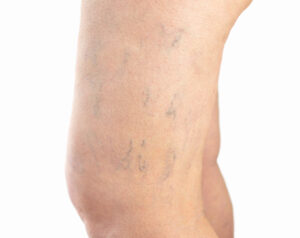When varicose veins bleed, it's a sign of serious vein disease. But it all starts with a smaller problem: spider veins! So many people think that varicose veins are a cosmetic problem. But did you know that it’s fairly common for even small spider veins to trigger bleeding episodes?
Yes, you read that correctly. Even if you have small spider veins, something as simple as a little cut or bump could cause you to bleed. A lot. In fact, you might bleed so much that you have to seek medical attention to make it stop. And, want to know something even scarier? Sometimes, that bleeding event could happen spontaneously. In fact, it often happens when you’re taking a hot shower. The warm water dilates (opens up) your veins and brings more blood flow to already weakened areas. At this point, since the veins are so close to the surface of your skin, they may simply rupture.
Now, the point of this post isn’t to terrify you into treating your spider veins. But we do want to help you understand that leaving them untreated could contribute to further medical complications. And cause you more problems than embarrassment when your legs are exposed.

While every individual is different, we usually see a common thread when varicose veins trigger bleeding. Typically, we see that a vein slightly above your bleeding site has become incompetent. (That means it’s valves aren’t working.) This incompetency has allowed blood to collect in the veins. And that blood puts pressure on those veins, making them both larger and more delicate.
Now, don’t forget, varicose veins are located fairly close to the surface of your skin. Which means that, over time, your varicose veins become large, weak, easily-impacted store-houses for your blood. Now you understand why people with vein disease are more vulnerable to bleeding episodes, and why those episodes may result in serious blood loss.
While rare, bleeding triggered by varicose veins that burst can be fatal. Now, if you're pretty healthy otherwise, that shouldn't happen. But if you are older or more socially isolated, a varicose vein bleed is more likely to cause serious harm. The same is true if you consume too much alcohol, take medication to prevent blood clots, or suffer from restricted mobility or dementia.
If you develop bleeding with your varicose veins, consider this side effect a medical emergency. Lie down right away, and elevate the affected leg above the level of your heart. Apply pressure to the site of your wound, and call for medical help if the bleeding doesn't stop quickly.
Actually, after a varicose vein bleed, you should always check in with your vein specialist. Why is that the case? Well, even if your varicose vein bleed doesn't prove fatal, it can still lead to serious complications. So, what can you do to prevent those complications? Well, the answer is fairly simple: treat your spider or varicose veins. That way, blood will stop pooling in your legs, and there will be less of a chance for serious blood loss if you do sustain a leg injury.
Fortunately, vein specialists like us offer a variety of different varicose vein treatments. The one you select will depend on your specific needs and, of course, the progression of our condition. But, you can’t pick a treatment without getting into the office. Which means that, if you have varicose veins and you’re worried about bleeding, you need to get scheduled for a diagnostic ultrasound as soon as possible. Contact our office today for an immediate appointment.

Scheduling
Please contact our dedicated specialists to schedule a consultation today.
2025 Texas Endovascular. All rights reserved. Website Design by Healthcare Success